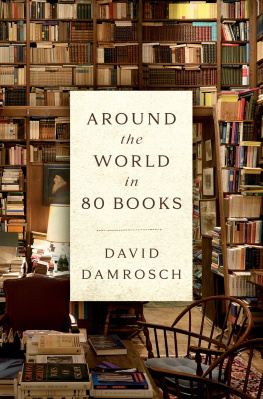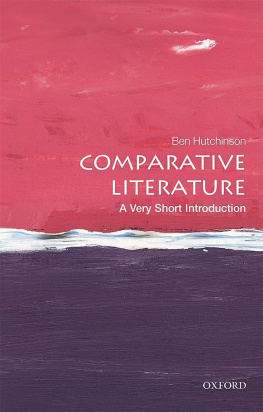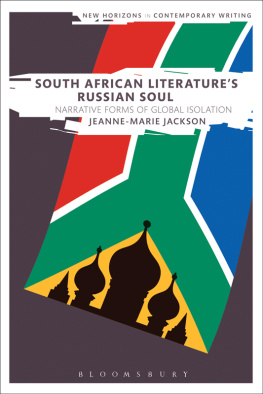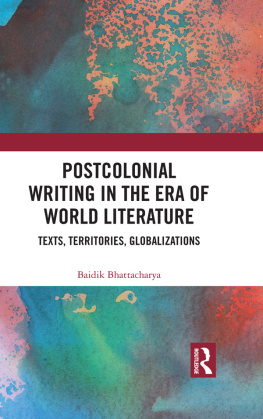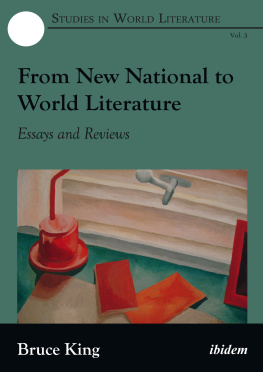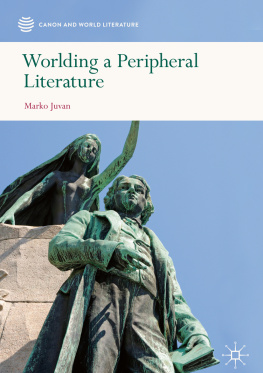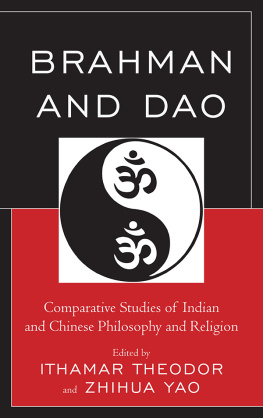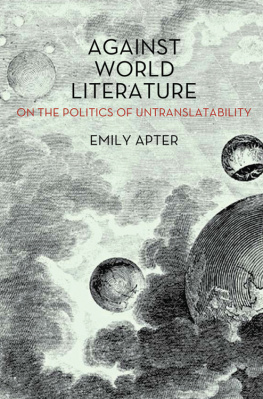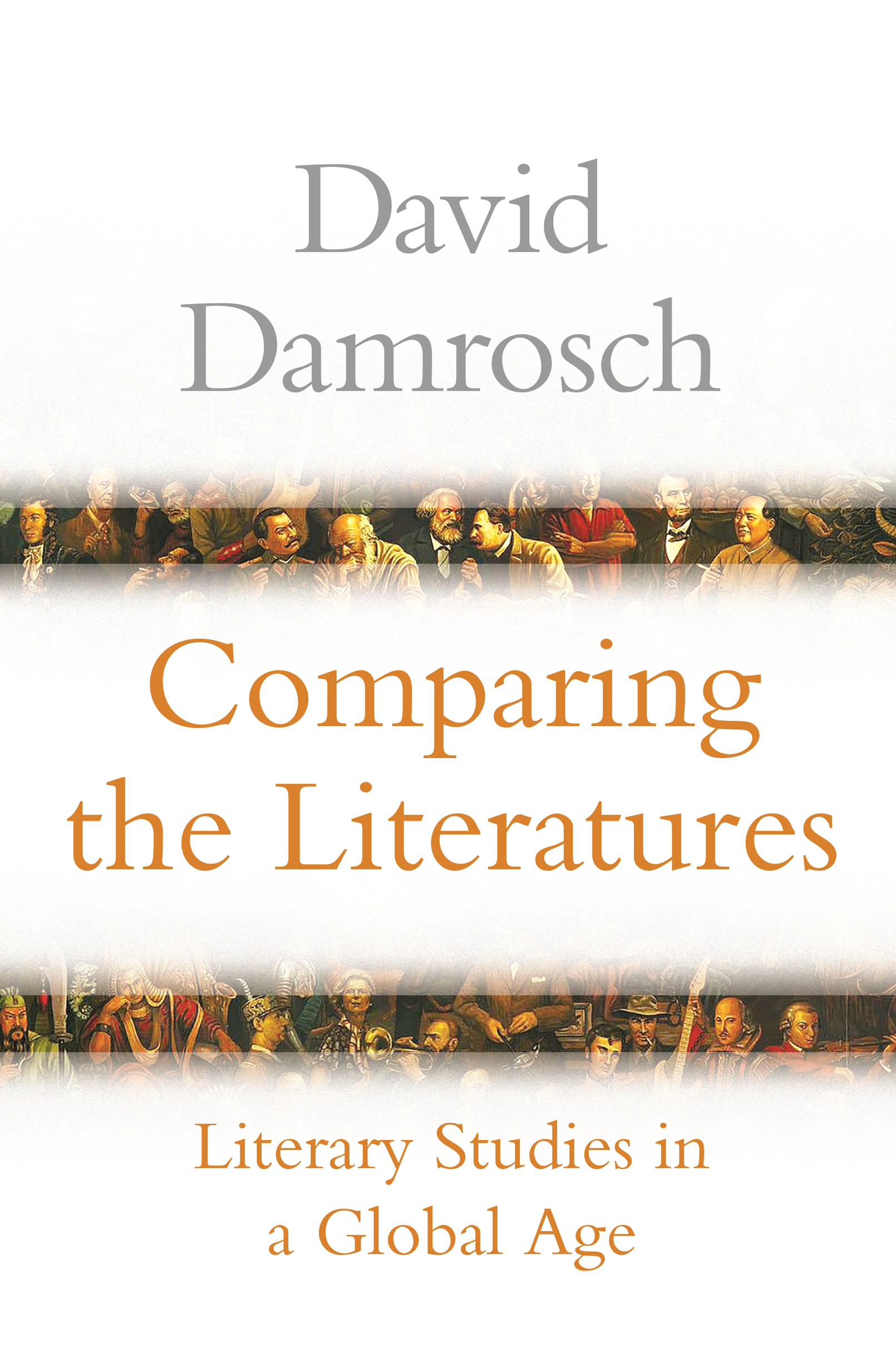Comparing the Literatures
David Damrosch
Comparing the Literatures

Literary Studies in a Global Age
PRINCETON UNIVERSITY PRESS
Princeton and Oxford
Copyright 2020 by Princeton University Press
Requests for permission to reproduce material from this work should be sent to permissions@press.princeton.edu
Published by Princeton University Press
41 William Street, Princeton, New Jersey 08540
6 Oxford Street, Woodstock, Oxfordshire OX20 1TR
press.princeton.edu
All Rights Reserved
First paperback printing, 2022
Paper ISBN 978-0-691-23455-7
Cloth ISBN 978-0-691-13499-4
ISBN (e-book) 978-0-691-20128-3
Version 1.0
Library of Congress Control Number: 2019956207
British Library Cataloging-in-Publication Data is available
Editorial: Anne Savarese and Jenny Tan
Production Editorial: Kathleen Cioffi
Text and cOVER Design: Carmina Alvarez
Production: Brigid Ackerman
Publicity: Alyssa Sanford and Katie Lewis
Copyeditor: Daniel Simon
Jacket art: From Discussing the Divine Comedy with Dante, by Dai Dudu, Li Tiezi, and Zhang An (2006). Courtesy of the artists
Illustrations
- . Acta Comparationis Litterarum Universarum
- . Lin Yutang with Lin Tai-yi demonstrating his typewriter
- . Great Moments in Lit Crit, Voice Literary Supplement, 1988
- . Paul de Man, before and after 1987
- . Ren tiemble, letter to his mother, 1913
- . Seminary Library and National and University Library, Ljubljana
- . Bartolom de Las Casas and John Phillips, Tears of the Indians
- . Canonicity as shown by citations in the MLA Bibliography
- . Final Fantasy Gilgamesh action figure
- . Electronic Arts edition of Dantes Inferno
- . EK Theater Performance of Grand Theft Ovid
- . Young-Hae Chang Heavy Industries, Screenshot from Cunnilingus in North Korea
- . World literature in the empyrean and down to earth
- . Dai Dudu, Li Tiezi, and Zhang An, Discussing the Divine Comedy with Dante
Acknowledgments
During the dozen years that this book has been percolating, I have amassed debts whose full acknowledgment would substantially increase the books size. I have tried out these ideas in lectures in some forty countries and have gotten many helpful suggestions in the process. Here I might mention several sets of talks that extended the discussion beyond a single session, with warm thanks to Suradech Chotiudompant at Chulalongkorn University, Chen Yongguo at Tsinghua, Mads Rosendahl Thomsen and Christian Dahl at Aarhus and the University of Copenhagen, Pter Davidhzi at Etvs Lornd and the Hungarian Academy of Sciences, Mitsuyoshi Numano at the University of Tokyo, and Gisle Sapiro at the cole des Hautes tudes en Sciences Sociales. Perhaps these names can stand for another two hundred.
Versions of sections of these chapters first appeared in the Saussy and Heise reports for the American Comparative Literature Association, the ADE Bulletin, the Canadian Review of Comparative Literature, Bermann and Porters A Companion to Translation Studies, The Comparatist, Comparative Critical Studies, Comparative Literature Studies, European Review, Moser and Simoniss Figuren des Globalen, MLQ, Modern Philology, Neohelicon, Hayot and Walkowitzs A New Vocabulary for Global Modernism, PMLA, The Routledge Companion to World Literature, and Translation Studies.
The following chapters owe much to conversations with my students, with participants and colleagues at the annual sessions of the Institute for World Literature, and during the meetings of the ACLA. Martin Puchner generously read and commented on the full manuscript, as did Delia Ungureanu, who also recommended the Chinese painting Discussing the Divine Comedy with Dante as the books cover image. I am grateful for sometimes very lively conversations with Emily Apter, Susan Bassnett, Sandra Bermann, Homi Bhabha, the late and deeply lamented Svetlana Boym, Pheng Cheah, Amanda Claybaugh, my brother Leo Damrosch, Wiebke Denecke, Theo Dhaen, John Hamilton, Eric Hayot, Ursula Heise, Djelal Kadir, Franco Moretti, Stephen Owen, Orhan Pamuk, Katharina Piechocki, Sheldon Pollock, Bruce Robbins, Haun Saussy, Gayatri Spivak, Galin Tihanov, Lawrence Venuti, Rebecca Walkowitz, Saul Zaritt, and Zhang Longxi. I am grateful as well to Young-hae Chang and Marc Voge, to Edward Kim, and to Samuel Whitehead for their kind permission to use their images. The saintly patience and sound advice of my editor Anne Savarese have kept this book on track, and Daniel Simons judicious copyediting has improved the resulting manuscript throughout. My wife, Lori Fisler Damrosch, has been stalwart in her loving support throughout the years.
This book would not exist without the generosity of my teachers in college and graduate school. I have previously dedicated a book to Michael Holquist; here I will mention four other names among many, each representing a different kind of debt. As an assistant professor with many set responsibilities, Margaret Ferguson made time to do a tutorial on Homer, Virgil, and Milton. Peter Brookss classes offered a compelling blend of theoretical sophistication and close reading, in open-ended but still focused seminar discussions. W. Kelly Simpson made learning Middle Egyptian a chance to encounter a very distant culture from multiple perspectives, from art and archaeology to political history to exceptionally close readings, down to the level of individual hieroglyphs and the likely provenance of a scribes handwriting. Finally, Nils Alstrup Dahl was a living link to the Enlightenment tradition of biblical scholarship, in which philology and hermeneutics went hand in hand. His characteristic expression of satisfaction with a piece of evidence was Its clear, while an ill-founded observation would be met with its opposite: Well thats not so clear. Clarity has been a prime virtue for me ever since.
It seems appropriate that these very different teachers, incomparable in both senses of the word, should have made me a comparatist.
Comparing the Literatures
Introduction
Late one night, half a century ago, as a graduate student in comparative literature neared the date of his doctoral oral exam, his wife dreamed they were woken up by the sound of a truck and a knock on the door. When her husband went downstairs to answer it, he found a pair of workmen, in overalls, who proved to be two of his examiners, Harry Levin and Renato Poggioli. Recounting this dream in 1968 in his presidential address to the American Comparative Literature Association, Harry Levin reported that the student reacted with that savoir-faire which is always so happy a feature of dreams. He simply remounted the stairs and reported to his wife, The men are here to compare the literature (Comparing the Literature, 6). This book is intended to answer the question behind the young womans dream: Just what was her husband doing with his life? And as for ourselves, how should we go about plying the comparatists trade today? How can we best address the many disparate literatures now at play in literary studies, and what do we really mean by comparing them?


